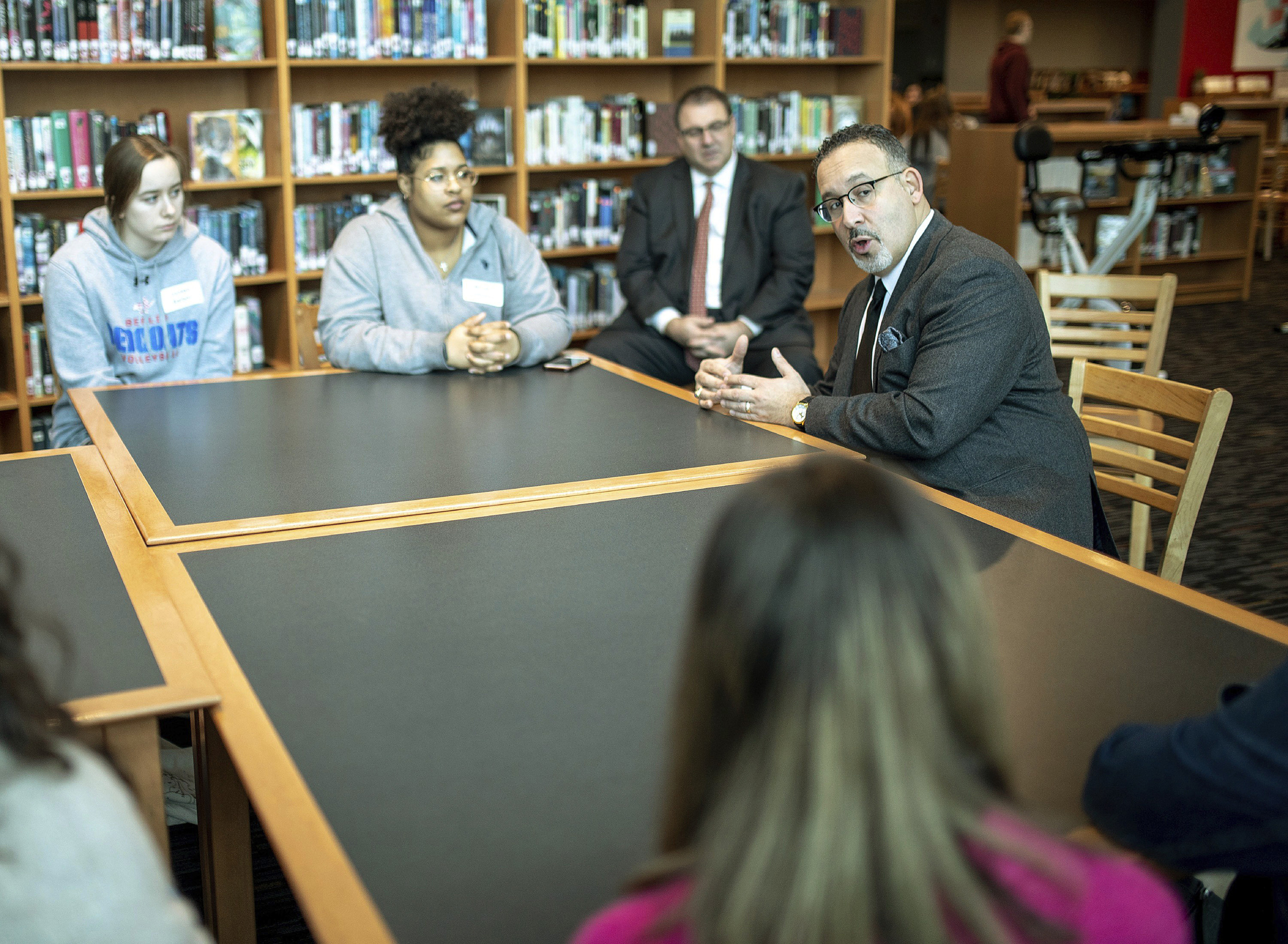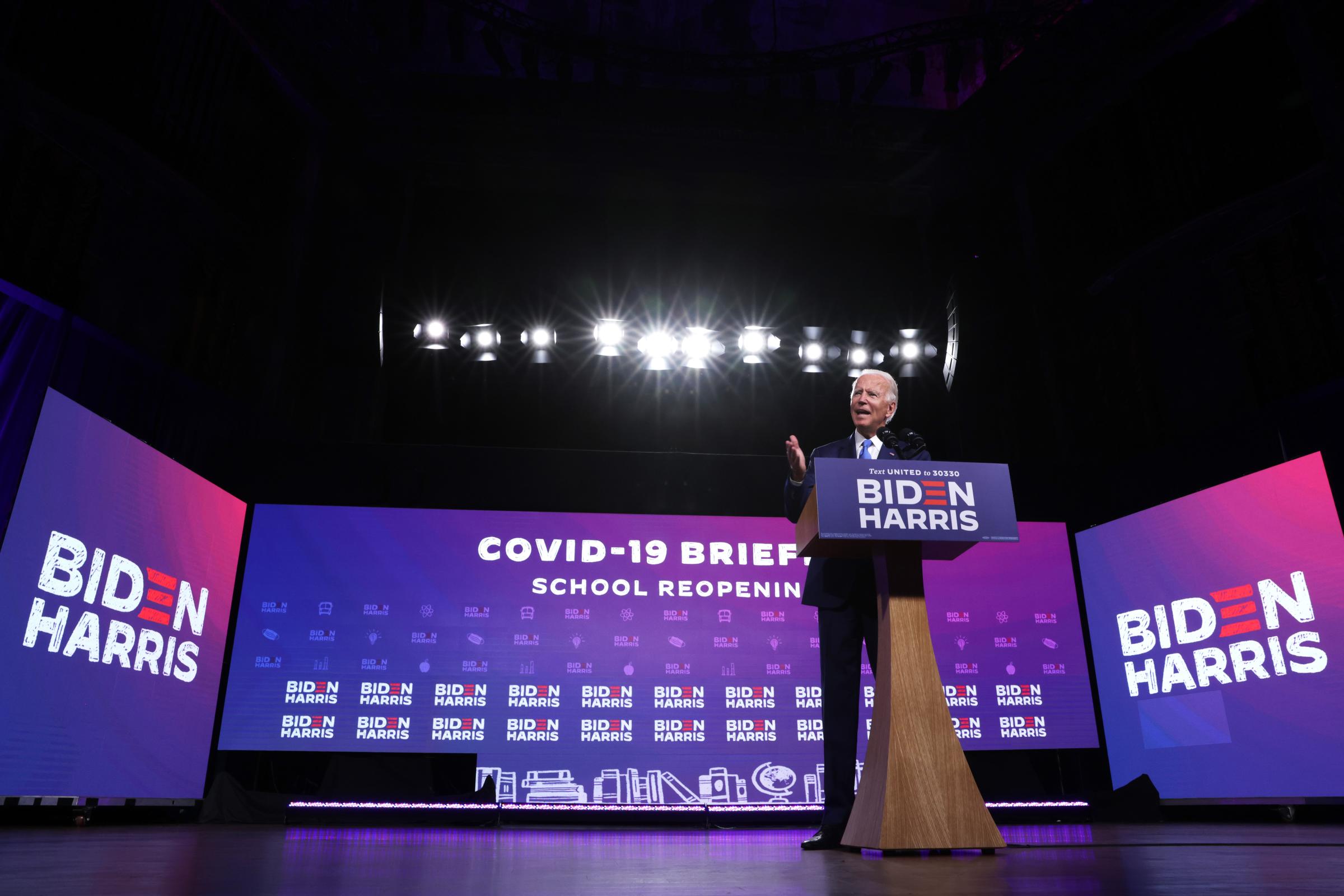
President-Elect Joe Biden nominated former teacher Miguel Cardona, Connecticut’s Education Commissioner, as his Education Secretary on Tuesday, choosing a proponent of school reopening during the pandemic who will face pressure to address inequities laid bare by the crisis and to roll back some policies of his controversial predecessor.
Cardona, a Latino who was born in Connecticut to parents from Puerto Rico, is the latest addition to what Biden has pledged will be the most diverse Cabinet in history. A former elementary school teacher and principal in Meriden, Conn., Cardona was appointed education commissioner in the state in August 2019.
His selection comes as the coronavirus pandemic continues to disrupt learning for millions of U.S. students. Some haven’t set foot in a classroom since March, fueling concerns about learning loss and educational inequity. Others have shifted back and forth between in-person and remote instruction as coronavirus cases have surged.
About half of U.S. students are currently attending schools offering virtual-only instruction, while about 33% of students are attending schools offering fully in-person learning, according a school reopening tracker by Burbio, which aggregates school and community calendars and has been monitoring the plans of 1,200 school districts.
Read more: The Learning Gap is Getting Worse as Schools Rely on Remote Classes
“As we work to address this educational crisis in the most important year, in the most important profession, there are also no easy answers,” Cardona, 45, wrote in a column last week for The News-Times in Connecticut, thanking teachers for their service this year. “If we provide safe in-person learning options for students, whenever possible, we can ensure we are doing everything in our control to level the educational playing field and reduce gaps in opportunities for our students. If we can do it safely, this is what we owe to them.”
Cardona and other Connecticut leaders have prioritized keeping schools open for in-person instruction this year, arguing there was little evidence of COVID-19 transmission within schools. As of Dec. 11, nearly 44% of school districts in the state were offering fully in-person learning, while 28% of districts were fully remote.
“In-person education is too important for our children to disrupt their education further, unless and until local conditions specifically dictate the need to do so,” Cardona said in a letter to school superintendents in November, the Hartford Courant reported.
In the past, Cardona has committed to closing educational achievement gaps between affluent and low-income students and between students of color and their white peers, especially as the pandemic exacerbates those inequities. Earlier this month, Connecticut leaders said the state had become the first in the country to distribute laptops to every student who needed one, and Cardona said “we must aggressively tackle” the digital divide that made remote learning far more challenging for the most vulnerable students this year.[time-
Our public schools are in a state of crisis, which is why this is going to be one of the single most important positions in Biden's cabinet.
On Tuesday, Biden praised Cardona’s leadership during the pandemic and said that as Education Secretary, he would work to “eliminate long-standing inequities and close racial and socioeconomic opportunity gaps.”
“In Miguel Cardona, America will have an experienced and dedicated public school teacher leading the way at the Department of Education — ensuring that every student is equipped to thrive in the economy of the future, that every educator has the resources they need to do their jobs with dignity and success, and that every school is on track to reopen safely,” Biden said.
While President Trump and Education Secretary Betsy DeVos repeatedly called on districts to fully reopen schools, the Trump administration faced criticism from education and health experts for providing little guidance or funding to help schools do that safely. As he enters office, Biden is facing pressure to bring the pandemic under control and improve the state of pandemic schooling. He has pledged to open most of the country’s schools within his first 100 days in the White House, but that goal depends on getting more funding to schools so they can reconfigure classrooms, improve ventilation in buildings and supply protective gear to students and teachers. Congress passed a $900 billion relief package on Monday, including $82 billion for K-12 schools and colleges, much less than previous versions of the bill, which had stalled for months.
“It should be a national priority to get our kids back into school and keep them in school,” Biden said in a speech on Dec. 8. “If Congress provides the funding we need to protect students, educators, and staff; if states and cities put strong public health measures in place that we all will follow, then my team will work to say that a majority of our schools can be opened by the end of my first 100 days.”

Biden, who earned vocal endorsements from the National Education Association (NEA) and the American Federation of Teachers, had said he would nominate a former public school teacher to be Education Secretary. And he has said he will work with teachers’ unions on reopening plans, promising they will also have an advocate in First Lady Jill Biden, a community college professor and NEA member.
“I have hope that we will be able to open our schools safely and equitably. I really do, for the first time in a long time,” Becky Pringle, NEA president, told TIME in November.
Pringle’s predecessor, Lily Eskelsen García, was reportedly among those being considered for the cabinet position, along with American Federation of Teachers President Randi Weingarten, Connecticut Rep. Jahana Hayes, a former national teacher of the year, and some school district superintendents, including Baltimore’s Sonja Santelises and Chicago’s Janice Jackson, the Washington Post reported. Leslie Fenwick, dean emeritus of the Howard University School of Education also emerged as a top contender, the Post reported.
The heightened challenges of educating students during the pandemic fueled interest in Biden’s choice. And beyond the pandemic, Biden’s education secretary is expected to reverse many of the policies implemented by DeVos, a divisive figure who scaled back civil rights enforcement by the Department of Education and eased oversight of for-profit colleges. DeVos, who advocated for minimal federal involvement in public schools and supported programs to let families use tax dollars for private schools, has frequently been ranked one of the least popular members of Trump’s Cabinet in public polls.
Read more: Education May Become the Pandemic’s Latest Casualty
“Our public schools are in a state of crisis, which is why this is going to be one of the single most important positions in Biden’s cabinet,” Jamaal Bowman, a former middle school principal and a Democrat recently elected to Congress from New York, said in a tweet earlier this month, calling for an Education Secretary “who will support and listen to educators, not make their lives even harder.”
While Cardona’s calls for in-person learning received pushback from teachers’ unions in the state, a union coalition representing 60,000 teachers and other school employees in Connecticut announced their support for Cardona when he became a contender for U.S. secretary of education.
“He has been tested by the unprecedented upheaval caused by the pandemic,” the coalition said in a statement. “While this challenge has been a rocky road—and many issues remain unresolved—teachers and school support staff have appreciated his openness and collaboration. If selected as Secretary of Education, Dr. Cardona would be a positive force for public education—light years ahead of the dismal Betsy DeVos track record.”
His selection on Tuesday drew praise from a range of education groups and teachers’ unions, even though they have staked out opposing positions on hot-button education issues, including school reopening and charter schools. Weingarten said Cardona’s “commitment to public education, to our students and to listening to and respecting the wisdom of educators will be crucial.” Pringle said he “has the compassion and life experiences that are needed” to lead the Department of Education.
And Jeanne Allen, CEO of the Center for Education Reform, which advocates for parents to have choices beyond traditional public schools and had opposed union leaders who were considered for the post, said Cardona’s nomination is “good news for the millions of parents and students whose fates have been so derailed by the coronavirus this year.”
More Must-Reads From TIME
- The 100 Most Influential People of 2024
- Coco Gauff Is Playing for Herself Now
- Scenes From Pro-Palestinian Encampments Across U.S. Universities
- 6 Compliments That Land Every Time
- If You're Dating Right Now , You're Brave: Column
- The AI That Could Heal a Divided Internet
- Fallout Is a Brilliant Model for the Future of Video Game Adaptations
- Want Weekly Recs on What to Watch, Read, and More? Sign Up for Worth Your Time
Write to Katie Reilly at Katie.Reilly@time.com